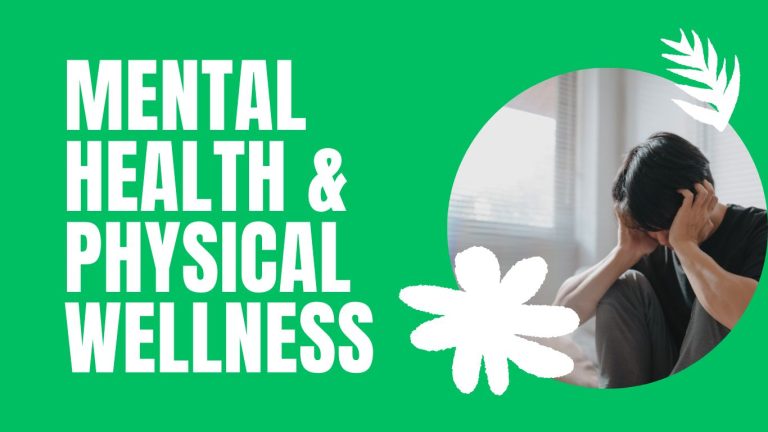Mental health and physical wellness are symbiotic, with one influencing the other in both positive and negative ways. Addressing these components holistically leads to better overall health outcomes, greater resilience, and a more enriched quality of life. Let’s delve deeper into the science, statistics, and strategies that underscore this vital connection.
The Bidirectional Relationship
- Physical Health’s Influence on Mental Wellness
Chronic illnesses often lead to mental health struggles. For example, individuals with diabetes are twice as likely to experience depression compared to those without. Chronic pain conditions, such as arthritis, are also heavily linked to anxiety and mood disorders. - Mental Health’s Role in Physical Wellness
Poor mental health impairs self-care behaviors, making individuals less likely to maintain a healthy diet, mediation, exercise, or seek Medical attention. Anxiety disorders can exacerbate conditions like hypertension, while depression increases the risk of heart disease and stroke
Exercise: The Natural Antidepressant and Stress Reliever
How Exercise Impacts Mental and Physical Health
Physical activity is one of the most effective ways to improve mental health. Exercise stimulates the release of endorphins, serotonin, and dopamine—neurochemicals that elevate mood and reduce stress. This also leads to improved sleep patterns, reduced fatigue, and enhanced focus.
Key Statistics:
- People who exercise regularly report a 40% reduction in poor mental health days.
- Aerobic activities like jogging, swimming, or cycling lower depression rates by as much as 26%, according to a meta-analysis of 49 studies.
Types of Exercise for Dual Benefits
- Mindfulness Practices: Yoga and tai chi combine physical postures with mental focus, reducing cortisol levels and improving emotional regulation
- Strength Training: Resistance exercises not only build physical strength but also reduce symptoms of depression and anxiety through hormonal balance
- Team Sports: Social interaction during team-based activities enhances feelings of connection and reduces loneliness—a known contributor to poor mental health
The Role of Nutrition in the Mind-Body Connection
The Gut-Brain Axis
Emerging research shows the gut microbiome plays a critical role in mental health. Poor diet can lead to gut dysbiosis, which is linked to anxiety and depression. On the other hand, a healthy diet rich in fiber, probiotics, and antioxidants promotes positive mental and physical outcomes.
Foods to Focus On:
- Omega-3 Fatty Acids: Found in fatty fish, they support brain health and reduce inflammation
- Antioxidants: Present in berries, nuts, and green tea, antioxidants protect against oxidative stress, a contributor to mental decline
- Complex Carbohydrates: Whole grains stabilize blood sugar levels, improving mood and energy
Expert Insight:
According to Dr. Uma Naidoo, a nutritional psychiatrist at Harvard, “You can think of food as the ultimate anti-anxiety medication or mood enhancer, as it influences brain chemicals directly through the gut.”
Stress Management: A Pillar of Wellness
Chronic Stress and Its Dual Impact
Stress triggers the “fight or flight” response, increasing cortisol levels, which can weaken the immune system, disrupt digestion, and lead to weight gain. Prolonged stress has been linked to higher risks of conditions like heart disease, while mentally, it contributes to anxiety, depression, and cognitive decline.
Stress-Reduction Techniques
- Mindfulness Meditation: Practices like mindfulness-based stress reduction (MBSR) have been shown to decrease cortisol levels and improve emotional resilience
- Time in Nature: Green spaces are associated with lower cortisol and enhanced mental clarity
- Deep Breathing Exercises: Techniques such as diaphragmatic breathing can activate the parasympathetic nervous system, inducing a state of calm.
Sleep: The Overlooked Link
Importance of Restorative Sleep
Sleep directly affects both mental and physical health. Sleep deprivation increases risks of hypertension, diabetes, and obesity while impairing emotional regulation and cognitive function. Conversely, mental health conditions like anxiety often disrupt sleep cycles.
Statistics:
- Adults with chronic insomnia are 10 times more likely to develop depression
- Restorative sleep improves immune function by as much as 50%, according to recent research on Social Daily
Tips for Better Sleep
- Maintain a consistent sleep schedule.
- Limit screen time before bed to enhance melatonin production.
- Practice relaxation techniques such as progressive muscle relaxation.
The Holistic Path to Wellness: A Multi-Faceted Approach
- Physical Health Care:
- Regular check-ups to manage chronic conditions.
- Proactive measures such as vaccinations and screenings.
- Mental Health Support:
- Therapy or counseling for stress, anxiety, and depression.
- Peer support groups to reduce isolation.
- Lifestyle Adjustments:
- Balanced nutrition and hydration.
- Consistent physical activity.
Integrating Practices
Combining these approaches ensures synergy between mental and physical wellness. For instance, practicing yoga not only strengthens the body but also calms the mind, offering dual benefits in a single activity.
Mental health and physical wellness are inseparable components of overall well-being. Neglecting one can adversely affect the other, creating a cycle of poor health. However, by prioritizing exercise, nutrition, stress management, and sleep, individuals can break this cycle and thrive.
Addressing these areas holistically, with the support of healthcare professionals and community resources, paves the way for a balanced and fulfilling life. As science continues to uncover the intricacies of this link, the opportunity to optimize both mental and physical health has never been more attainable.





